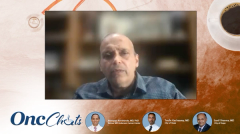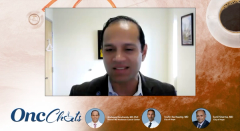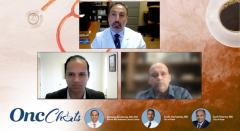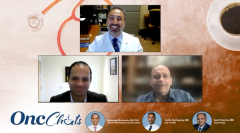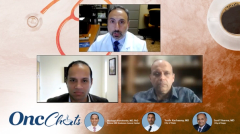
Leveraging Immunotherapy in GI Malignancies: Research, Including Organoids and Ablation
In this episode of OncChats: Leveraging Immunotherapy in GI Malignancies, experts discuss research efforts being made with organoids to address existing questions with immunotherapy and the exploration of multimodality approaches to improve outcomes.
Episodes in this series

In this fourth episode of OncChats: Leveraging Immunotherapy in GI Malignancies, Toufic Kachaamy, MD, of City of Hope, Sunil Sharma, MD, of City of Hope, and Madappa Kundranda, MD, PhD, of Banner MD Anderson Cancer Center, discuss research efforts being made with organoids to address existing questions with immunotherapy and the exploration of multimodality approaches to improve outcomes.
Kachaamy: [We also know] that different tumors and different metastases are responding differently [to immunotherapy]. How much of that is the tumor itself? How much is the tumor microenvironment? I know you have also done a lot of work with organoids. What have you learned about the tumor microenvironment, and can we manipulate that to help with immunotherapy? Almost certainly, this discrepancy we’re seeing between [liver] metastases and lung metastases, as an example, is probably not due to tumor-intrinsic effect; it’s due to the microenvironment effect. The liver, as we all know, is a highly immunosuppressive environment because [it] is a detoxing organ; it has evolved into an immunosuppressive entity so one could argue that’s why immune therapy is not working very well.
However, we started an organoid program 4 or 5 years ago, and now we have a huge, array of [research]. We take biopsies of these patients, and we sort of grow them in high quantities in 96-well plates, etc. Then, we’ve developed these immune organoids, where we can layer the immune cells on top using inserts on these plates, and we combine this with the genomics of the particular person and try to develop new hypotheses. Our paper is going to [be published] soon, and it shows how this can add to the options that the patients might have because right now, the best genomics that we all use is primarily a DNA-based genomic alteration. Those [alterations] are present in maybe 15% or 20% of patients; the rest of them are either not targetable or not present.
We’re trying to expand that horizon using RNA proteomics, and then we can test those hypotheses that come out of these kinds of ohmic analyses on the organoids and hopefully try to cull down the number of things we can use on patients and hopefully they’ll be more effective. We can also use these models to develop hypotheses about early polyps and what we can do to manipulate early cancers. We’re working with other gastroenterologists to create organoid models for early cancers or more high-risk polypoid conditions to see if we want to detect chemoprevention strategies. In patients who have a large number of polyps, do we want to do an intervention? These models can also be used to study that.
Kachaamy: In looking at multimodality therapy, the comment you made about [loving to] working with gastroenterologists, it's the other way around, we love working with oncologists; we learn so much from them. The endoscopists have the ability to get tissue safely and to potentially impact the tumor through ablation, for example. Do you see any future role for ablation combined with immunotherapy to manipulate the tumor microenvironment? There are many modalities currently available for cancer ablation that we have endoscopically.
Sharma: Yeah. I think we’re just opening the curtains here, and there’s going to be lots of different things that we can combine with immune therapy. Obviously, I know that you have a lot of interest in ablation, and we have a lot of patients, like Dr Kundranda was saying, young people who have lots of esophageal cancer, for instance, or cholangiocarcinoma, even colorectal cancer, that is metastasized where we can use ablative techniques along with immunotherapy and that’s going to hopefully increase local control but also systemic control. All those trials are coming. That’s the exciting future that we have. As things get better, early detection comes in and I think we will make a very big change here in the next 4 or 5 years. I’m really optimistic for the first time in my career with GI oncology.
Kundranda: I think you’re spot on, Dr Sharma. Previously, we would always look at our gastroenterology colleagues not as a truly integral part of our team but as the ones who would help us. But right now, when I think about our GI oncology team, it truly is a medical oncologist, radiation oncologist, surgical oncologist, and [others]. It has been truly remarkable [with regard to] some of the stuff that we can do, even with, like you mentioned, the combination of ablation with IO therapy or any of these modalities, which can certainly help kind of improve the immune response.


